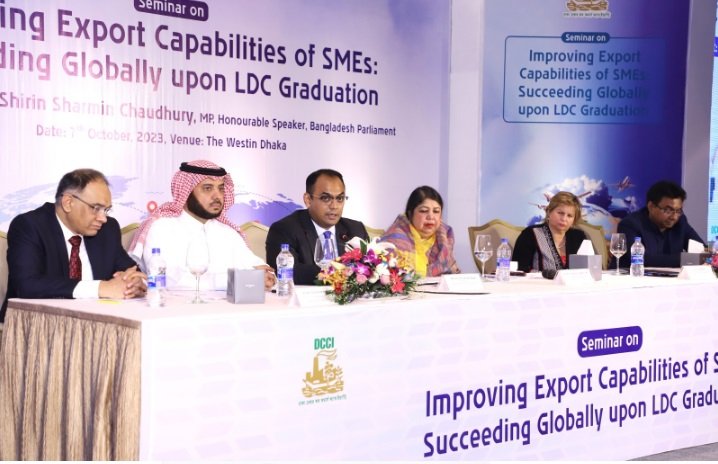
Speakers at a seminar have underscored the need for a strong ecosystem in Small and Medium Enterprises (SMEs) in a bid to boost the export capacity.
They also put emphasis on ensuring technological and financial support, marketing facilities, research and innovation, product diversification and cluster-based infrastructure for the overall development of the sector.
They made the remarks at a seminar on “Improving export capabilities of SMEs: Succeeding globally upon LDC graduation” organised by the Dhaka Chamber of Commerce & Industry (DCCI) at a hotel on Saturday.
Selim Raihan, executive director of SANEM, presented a keynote presentation at the seminar citing some challenges in the country’s SME sector.
In his keynote speech, he said that Bangladesh’s SME sector is going through a few challenges like capacity constraints, lack of policies and regulatory issues, financing, infrastructure and skilled manpower.
The import tariff of the country’s SME sector is a bit high, he claimed and emphasised faster customs and trade regulations.
He also urged for a conducive and investment-friendly tariff regime, consistent tax rates, a predictable policy regime and a stable macro-economic situation.
“We have to address the high rate of None-performing Loans (NPL), weak capital market, the high operational cost of SME financing and weak integration with the financial system,” said the economist.
Taking part in the programme as the chief guest, Speaker of Parliament Shirin Sharmin Chaudhury said the SMEs of Bangladesh are resilient enough and contribute more than 30 percent to the GDP.
“Still this sector has various challenges and I hoped that the policymakers concerned would try to address these issues to solve the existing problems,” she said.
She invited SME entrepreneurs to utilize technology to access the virtual market. “We can also give them a One Stop Service so that they can avail all required services from one place and for that, we need to make coordinated efforts. Women entrepreneurs can take up to taka 10 lakh loan collateral free, she informed. Policymakers may think about lessening the customs duty for the import of raw materials that are needed for SMEs,” she added.
DCCI President Sameer Sattar in his speech said that it needs to be prepared as the exporters including SMEs will face tariffs ranging from 8 percent to 16 percent on exports in 2026.
“We have a very strong SME base in Bangladesh. SMEs contribute 28 percent to the country’s GDP, 45 percent manufacturing value addition and account for 90 percent of the jobs in the private sector. To facilitate enhancing export capabilities of our SME sector, I suggested redefining SME definition by excluding ‘Medium’ businesses as a medium are largely privileged.”
He also called up authorities of different banks to provide SME-tailored export financing like credit insurance, export development funds, and working capital loans to address export-related financial challenges.
He also underscored the importance of having a central SME database with updated information.
Ambassador of Canada to Bangladesh Lilly Nicholes said Canada is working with Bangladesh in the technology and vocational sector and underscored the need to sign FTAs with potential trading partners to face various challenges like access to finance, and technical barriers in the SME sector.
She emphasized more research so that SMEs can add value to their products and enhance their capacity in the export market. Canada is happy to work with Bangladesh in terms of capacity building, research, collaboration and skills development.
Ambassador of Saudi Arabia in Bangladesh Essa Yousef Alduhailan said Saudi Arabia put more emphasis on SMEs in Bangladesh.
In the post-pandemic period, Saudi Arabia facilitates their SMEs by supporting them to revive.
These supports include the Implementation of new regulations, reform measures financial assistance by the Saudi Government, he said.
“Bangladesh has a strong and diversified export market. Jute, shrimp, vegetables, pharmaceuticals and RMG are some of the major products of Bangladesh. Bangladesh is going to graduate into middle-income country and this transition needs more investment in education, technology and innovation. If Bangladesh can take similar policies and programmes likewise the SMEs in Saudi Arabia to benefit Bangladesh,” he said.
 Weekly Bangla Mirror | Bangla Mirror, Bangladeshi news in UK, bangla mirror news
Weekly Bangla Mirror | Bangla Mirror, Bangladeshi news in UK, bangla mirror news







